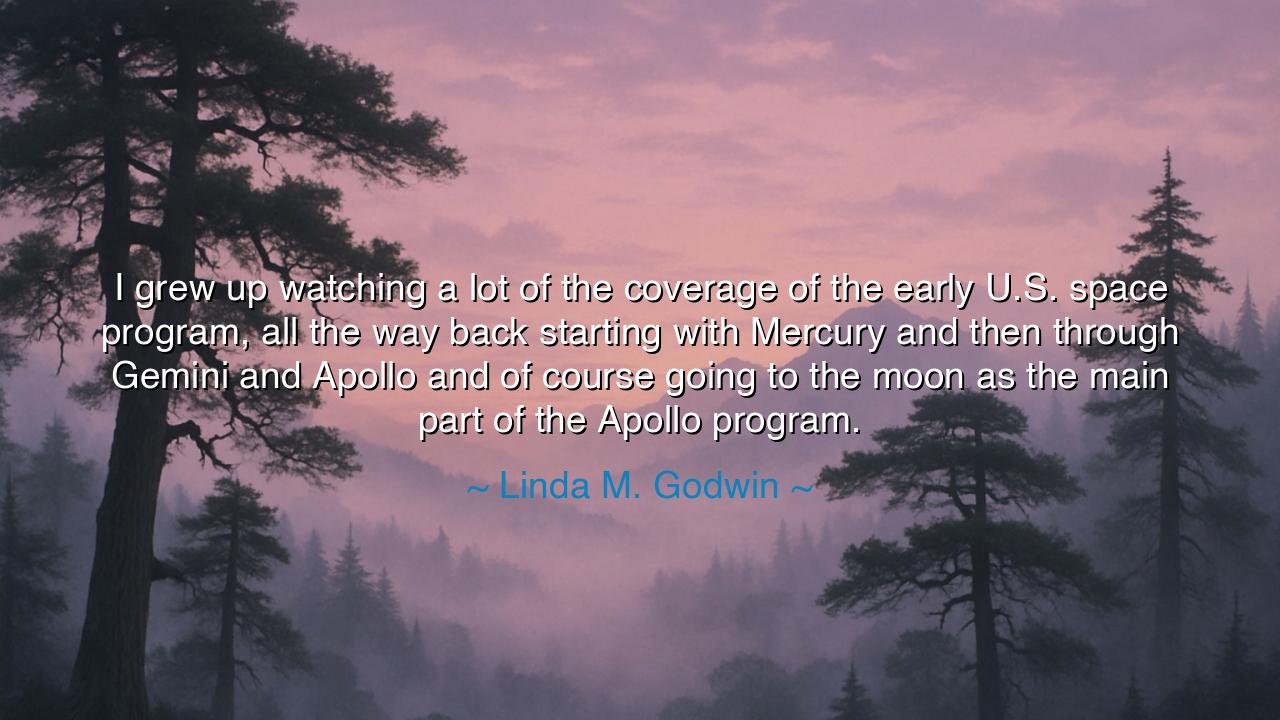
I grew up watching a lot of the coverage of the early U.S. space
I grew up watching a lot of the coverage of the early U.S. space program, all the way back starting with Mercury and then through Gemini and Apollo and of course going to the moon as the main part of the Apollo program.






"I grew up watching a lot of the coverage of the early U.S. space program, all the way back starting with Mercury and then through Gemini and Apollo and of course going to the moon as the main part of the Apollo program." — these words by Linda M. Godwin, a scientist and astronaut, speak of a deep, lasting connection between the human spirit and the quest for the stars. Godwin’s recollection of her childhood and the awe-inspiring space missions that unfolded before her eyes is not just a personal memory, but a testament to the way the space program captured the hearts and minds of an entire generation. It was a time when the impossible became possible, and the vast expanse of the universe seemed within reach.
The early U.S. space program, with its ambitious Mercury, Gemini, and Apollo missions, marked a turning point in human history. Mercury, the first manned space program, was born from the cold war between nations, driven by a race to conquer space and claim the mantle of superiority. Yet, despite the tension of the times, there was something deeply unifying in the images of men, clad in the bright suits of NASA, soaring into the unknown, their hearts filled with hope and courage. Each mission, each step, brought humanity closer to the moon, to the stars, and to a deeper understanding of our place in the cosmos.
The Gemini program, though not as well known as Apollo, was crucial in the development of the techniques and technologies that would make space travel possible. It was in Gemini that astronauts first conducted spacewalks and perfected the art of rendezvousing with other spacecraft—pushing the boundaries of human capability. Yet it was the Apollo program, culminating with the iconic moon landing of Apollo 11, that truly captured the imagination of the world. As Neil Armstrong took that first step onto the lunar surface, he not only changed the course of history, but he gave humanity something even more profound: the belief that the impossible was not only achievable but within our grasp. The moon became a symbol of human achievement, and the stories of those who traveled to it, like Godwin, were etched into the collective consciousness of generations.
In the same way that Odysseus journeyed across the seas in the ancient myths, so too did the astronauts of the space age embark on their own heroic odysseys. The Greek heroes, from Hercules to Perseus, faced impossible tasks, fighting monsters and gods to complete their quests. But in the space program, it was the human spirit that was the true hero. These astronauts did not battle mythic beasts; they battled the forces of nature, the confines of their own fears, and the uncertainty of the unknown. And in doing so, they left an indelible mark on the history of mankind. Just as Achilles' strength and courage became the stuff of legends, so too did the bravery of the men and women who dared to venture into the void of space.
But Godwin’s words remind us that the space program was not just about the astronauts—it was about the generation that watched them. For those like Godwin, growing up during this time, these missions were not just events on the evening news; they were the very heartbeat of a new world, a world where dreams could be realized, where the limits of human achievement could be stretched beyond the stars. To watch the Mercury, Gemini, and Apollo missions unfold was to witness a revolution of the mind, an affirmation that anything was possible if we dared to reach for the heavens.
What is the lesson we can draw from Godwin’s words? It is a reminder that dreams have the power to shape the future. The space program was not simply about technological advancement; it was about inspiring generations to believe in the infinite potential of the human race. The story of these early missions is not just about rockets and satellites, but about the transformation of the human spirit—the courage to dream big, the determination to overcome, and the willingness to explore the unknown. These qualities are not confined to the astronauts or the engineers who worked on those missions; they belong to all of us, and they can propel us forward in any endeavor we choose.
In our own lives, let us take up the mantle of those early space explorers. Let us be inspired by their vision and their courage to embark on our own journeys, no matter how daunting they may seem. The space program taught us that humanity is capable of greatness when it dares to dream and takes bold steps toward the impossible. We must live with the understanding that the moon, the stars, and the cosmos are not beyond us—they are waiting for us to reach for them. Whether it is in our careers, our personal lives, or our human connections, let us carry forward the spirit of exploration and discovery that the Apollo program so powerfully ignited. The universe is vast, but the potential of the human heart is even greater. Let us go forward with that courage, always striving to make the impossible, possible.






AAdministratorAdministrator
Welcome, honored guests. Please leave a comment, we will respond soon